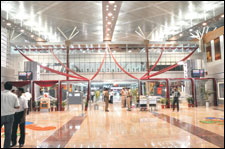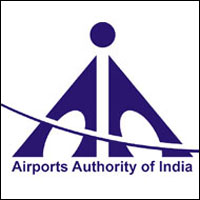Airport Authority of India’s (AAI) decision to privatize six airports in the country is on the expected lines. Task Force on Financing Plan for Airports for 12th Five Year Plan had recommended the private participation in operation, management and development of 20 select airports in the country and the latest decision is part of that recommendation. It seems the UPA government which has received flak for policy paralysis and prolonged period of administrative inaction wants to prove its reformist inklings through this second leg of airport privatization.
AAI had issued invitation last month for RFQ from eligible companies for operation, management and transfer of six airports in the country, namely, Chennai, Kolkata, Guwahati, Ahmedabad Jaipur and Lucknow. “Though the intention of the government is right, the same thing cannot be said about the timing” said Ammeet Agarwal, CEO, Supreme Aviation International.
 When most of the infrastructure companies are bleeding red and facing severe liquidity crunch, government’s move to invite private participation in airport development and operation is definitely not devoid of any risks. Also aviation sector is not in the pink of it health with air traffic stagnating after seeing robust growth in 2008-09. But the government is encouraged by the performance of private airports at Delhi and Mumbai. “After awarding the Delhi & Mumbai airports to Joint Venture companies namely, Delhi International Airport Pvt. Ltd. (DIAL) and Mumbai International Airport Pvt. Ltd. (MIAL) respectively, it has been observed that the introduction of PPP model at these airports has led to a significant improvement in the infrastructure and rise in the collection of revenues, especially non-aeronautical Revenues”, said K. C. Venugopal, Minister of State for Civil Aviation in August while replying to a question in the recently concluded Parliament session.
When most of the infrastructure companies are bleeding red and facing severe liquidity crunch, government’s move to invite private participation in airport development and operation is definitely not devoid of any risks. Also aviation sector is not in the pink of it health with air traffic stagnating after seeing robust growth in 2008-09. But the government is encouraged by the performance of private airports at Delhi and Mumbai. “After awarding the Delhi & Mumbai airports to Joint Venture companies namely, Delhi International Airport Pvt. Ltd. (DIAL) and Mumbai International Airport Pvt. Ltd. (MIAL) respectively, it has been observed that the introduction of PPP model at these airports has led to a significant improvement in the infrastructure and rise in the collection of revenues, especially non-aeronautical Revenues”, said K. C. Venugopal, Minister of State for Civil Aviation in August while replying to a question in the recently concluded Parliament session.
Interestingly, the government has already spent substantial sum of money on creation of new terminal and other airport infrastructure at the six airports it plans to privatize. In fact the AAI had spent Rs. 5,800 crore on these airports during last few years and it expects the private parties to spend additional Rs 4,250 crore on these airports. If the government was planning to privatize these airports why AAI should have invested so much money on these airports? It could have very well asked the private parties to spend on building new terminals also. AAI could have preserved its limited resources for the development of other airports.
|
||||||||||||||||||||||||||||
Six airports which the government is planning to privatise account for 92% of the passenger traffic at AAI owned 16 international airports. In other words, after privatization of these airports, AAI will be left with 10 airports whose revenue may not be sufficient to manage their operations. In terms of passenger traffic both Chennai and Kolkata, stand above Hyderabad airport and considering the uncertainty prevailing over the status of Hyderabad city, prospects of Chennai airport seems to be bright and may attract substantial interest from the private players.
AAI has specifically allowed the potential developers to charge User Development Fees from the passengers for the development of airport. It may be recalled here that AAI while taking up the major expansion projects at Ahmadabad and Trivandrum had envisaged levy of User Development Fee of Rs.300 per passenger as prescribed Initial Rate of Return (IRR) was not being achieved. However, the proposal was turned down by the Government.
|
||||||||||||||||||||||||||||||||||||||||||||||||||||||||
One of the conditions regarding the SPV to be formed for the purpose shall not include any equity ownership of a scheduled airline, cargo airline or its group entities exceeding 5% (five per cent) of the total equity of such SPV. If one goes by the intent of this clause Tata companies will not be eligible for applying for these tenders. However, Tatas may still make it to the elite list saying that airline they are intending to invest are not operational at the time of formation of the SPV.
Both GMR and GVK, who already own two airports each, too are allowed to participate in the bidding process. Thus, they may get controlling interest in most of the airports privatized in the country. In its zeal to privatize airport infrastructure in the country, the government may end up in promoting private duopoly.
If everything moves as per schedule, AAI should be able to sign Concession Agreement with the parties by next February. However, entire schedule may go haywire if the government calls for early General Elections.











